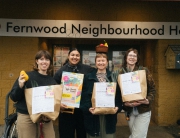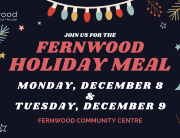›› Lauren Gaultier
After many years of planning, the Vic High Learning Farm was a joint initiative prompted when a former faculty member reached out to Aaren Topley, Capital Region’s Community Animator, of Farm to School BC, for help in creating a sustainable farming program. With much behind the scenes effort, Topley was able to create connections, stimulate conversation, and encourage participation to turn this dream into reality.
Since first planting in April of this year, the Vic High Learning Farm has hosted tours and educational programming to nearly 200 students and faculty. They have grown beans, peas, kale, squash, tomatoes, herbs, including lots of basil, and even a crop of baby arugula. The harvest from the farm has been used to prepare salads, soups, and galettes in three of Vic High’s Home Economics (Ec) classes. Outside of the school, the produce has contributed to local fare at restaurants like Be Love, The Empress, and grocery stores like The Market on Yates.
As a part of Vic High’s model, it was always intended to be productive and self-sustaining, thanks to the contributions of local Farmer and Mason Street City Farm Co-steward, Jesse Brown. Topley reached out to Brown to propose the idea of his involvement and build the partnership which has proven to be rewarding.
Brown’s interest and enthusiasm in farming is evident in his contributions with the students and his passion speaking about the possibilities of the future for the farm. The obvious possibilities include replicating the model for other schools, but this will require both time, resource commitments, and significant planning; in the short term, both Brown and Topley are interested in refining and perfecting the current model at Vic High. Some short-medium term goals include having more regular student involvement including participation from other age-groups from surrounding schools like Central and George Jay. Additionally, they would like to see a wider array of classes frequenting the farm during the school year (think Biology, Chemistry, Finance). Other ideas include having a direct to customer farm stand at the school and a dedicated elective course for Farming and Agriculture.
The shared lesson learned, from both Topley and Brown, was the importance of engaging students, faculty, and community members to feel inspired and committed to the success of the program from the beginning. If you would like to get involved or continue encouraging the success of the Vic High Learning Farm, here are some of the actions you can take:
- Reach out to Faculty, Administration, and local elected officials to express your appreciation and support of this initiative
- Sign up for a local produce box program at either Mason Street City Farms by sending them an email, or through Fernwood NRG’s Good Food Box
- Take a tour at a local farm or sign up for agriculture, farming, permaculture, or composting workshops
To learn more about the work of Farm to School BC, visit farmtoschoolbc.ca, or of North Park’s Mason Street City Farm, visit masonstreetfarm.com.






